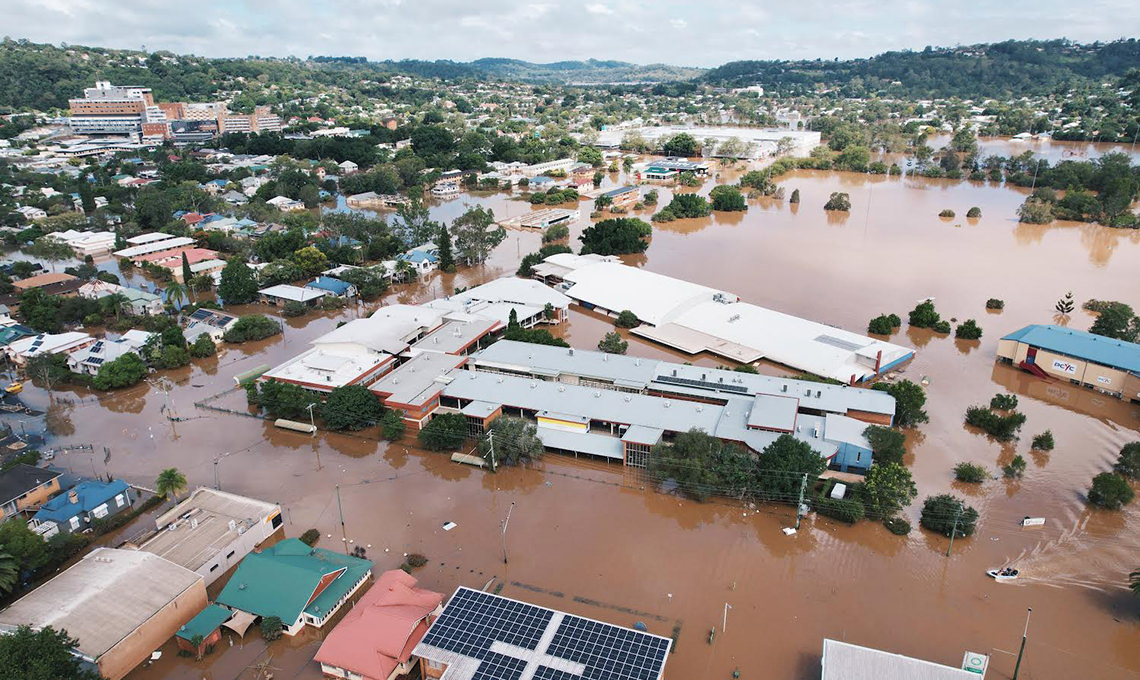
Helping a community stay connected after record floods
In February 2022, Lismore in north-eastern New South Wales, Australia endured four days of torrential rain. This extreme weather event caused devastating floods that eclipsed previous records and severely impacted the town.
Southern Cross University (SCU), located in an elevated area of Lismore, volunteered to be the central hub for Lismore residents, businesses, essential services and organisations participating in recovery efforts. To operate as the hub, SCU had to stay online. The University’s primary network link went down when the floods hit, and it was almost knocked completely offline when its secondary link was impacted by rolling power outages.
Working in collaboration with AARNet, Australia’s national research and education network, and other infrastructure providers, and with diverse AARNet connectivity options available, SCU was able to maintain active network and internet connections and start setting up an evacuation centre.
Lismore residents, Queensland Police, State Emergency Service, Australian Defence Force, banks, medical facilities, and multiple schools relied on the internet connection SCU provided using the AARNet network to get back online.
Campus connectivity for K-12 school
The University offered space to Trinity Catholic College Lismore, one of the largest schools in the region. The flood waters had wiped out classrooms, on-site IT infrastructure and network connectivity across Trinity’s two campuses.
In the days that followed the disaster, with the Learning Management System (LMS) housed on campus systems lost under floodwater and the personal lives of so many students and staff affected, teaching and learning was put on hold until a way to get the school up and running again could be found. SCU came to the rescue, offering Trinity space on its Lismore campus, and a week after the flood peak, Trinity had classrooms set up and classes were back underway.
The AARNet and SCU teams worked closely with the Trinity ICT team to deploy an internet connection as quickly as possible so that the students could start learning again. It was vital for Trinity to have as little downtime as possible during this time, particularly for the older students studying for the Higher School Certificate.
Trinity was given access to the SCU data centre and its ICT team quickly got the LMS and internal IT infrastructure back online using SCU’s AARNet network connection. Trinity then brought students onto the campus in a reduced capacity, as the allocated space only allowed about half the school to be at the campus at any one time. Using the online learning systems they had developed a few years earlier due to the COVID-19 pandemic and lockdowns, Trinity was able to implement a rotating schedule, with half the school on site and half the school learning from home.
AARNet later deployed a dedicated 1Gbps network connection for Trinity, giving the College oversight of its own network and independence from SCU infrastructure. To cater for Trinity’s growing connectivity requirements, a 10Gbps AARNet connection is slated for deployment in 2023.
Challenges and opportunities
Relocating the school to a university campus came with challenges and opportunities. As the campus is an open environment without any defined boundaries, it took a lot of planning to make the site work as a school with pick-up areas for parents, bus stops to shuttle students to and from the campus and facilities for specialist classes. But to counter those challenges, the SCU location has provided Trinity students with invaluable access to university infrastructure and collaboration opportunities with academics, which will allow them to prepare for tertiary education in ways that were unavailable before.
On the SCU campus, from the start of term two in 2023, the entire school will be located at one site for the first time. This is something Trinity has been striving to achieve for a long time, as teachers and students have always had to travel between the school’s multiple locations throughout the day. Trinity will remain at the SCU campus until decisions about its ultimate location are finalised.
Featured image: Floods inundate Trinity Catholic College and Lismore township in February 2020. Image credit: Trinity Catholic College
This story was first published as a case study on the AARNet website: Staying connected through adversity
For more information please contact our contributor(s):

